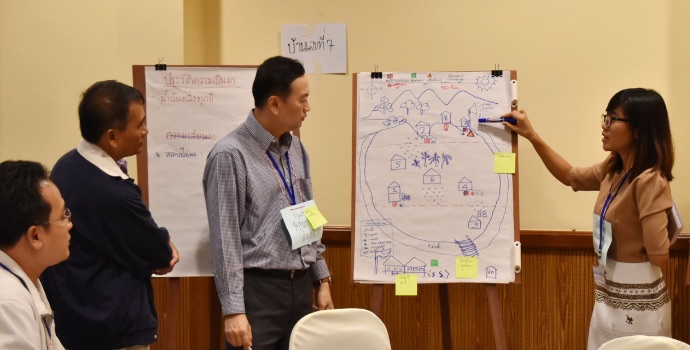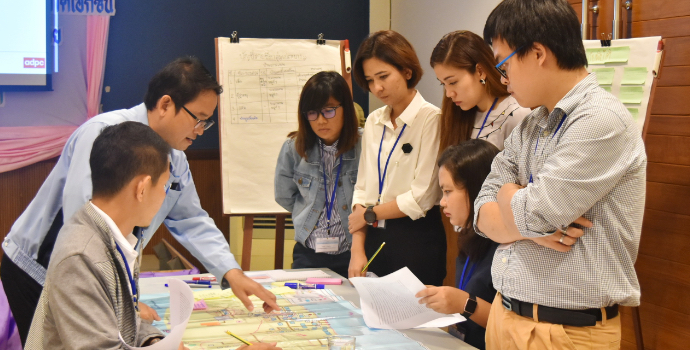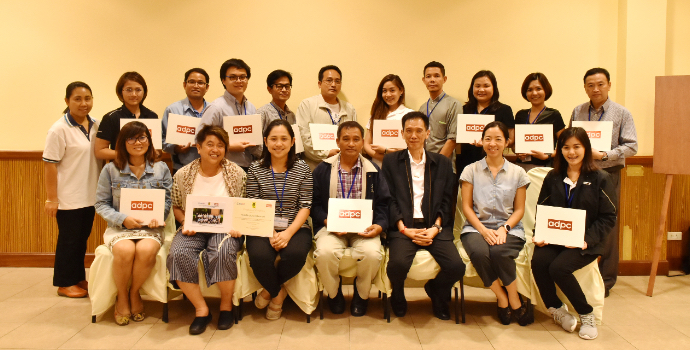- About Us
-
Who we are
-
- Publications
-
- ADPC Academy
-
MediaADPC'S NEWS
Engaging the private sector in community flood risk reduction in Thailand Engaging the private sector in community flood risk reduction in Thailand
23 - 24 May 2017
Bangkok, Thailand

Participants draw a community map to highlight vulnerabilities and capacities of local business in a hazard-prone area.ADPC’s five-year program for ‘Reduction of Vulnerability to Floods in Thailand’ concluded its last phase, which was being implemented in three provinces in central Thailand, by organizing a series of events to promote cooperation between the private and public sectors.
Through a consultative meeting followed by a training workshop, the last phase of the project brought the private and public sectors together to network, discuss, and exchange knowledge on corporate social responsibility (CSR) and disaster risk reduction (DRR).
The multi-year program which started in 2012 was funded by the U.S. Agency for International Development's Office of U.S. Foreign Disaster Assistance (USAID/OFDA). The third phase targeted Ayutthaya, Singburi and Ang Thong provinces in central Thailand.
Brainstorming: how can private sector enhance disaster resilience?
The consultative and brainstorming meeting on “Private Sector and Disaster Risk Reduction” was held in Bangkok on 25 April. The meeting brought together private sector representatives, DRR specialists, and academics to gain insights on how business can contribute to enhancing the disaster resilience of the societies and communities in which they function. The meeting provided a platform for interested companies to explore how they might incorporate Disaster Risk Reduction approaches as part of their CSR and sustainability strategies.
The interaction between DRR specialists and private sector entities produced in-depth discussions on pathways to incorporate DRR into CSR strategies. The consultation meeting produced concrete suggestions to develop guidelines for private companies to implement CBDRR (Community Based Disaster Risk Reduction) as part of their CSR initiatives. Outcomes from the consultative meeting provided the ADPC project team with inputs for developing a curriculum which was delivered at the training conducted the following month.
Ms. Ratchanee Muangprasert, CSR Officer, PTT Public Company Limited, who participated in the consultative meeting, shared her organization’s perspective. “PTT realizes that DRR is vital to us and the community. Likewise, PTT believes that it is possible to work together with the community to reduce disaster risks,” said Ms. Ratchanee Muangprasert.
Participants use a map to discuss participatory risk assessment tools to better understand how the community-based disaster risk management can be incorporated into corporate social responsibility strategies.
Training incorporating community-based disaster risk reduction into corporate social responsibility strategies
Training on “Incorporating Community Based Disaster Risk Reduction into Corporate Social Responsibility strategies” was organized on 23-24 May in Nakhon Nayok province. Fourteen private sector representatives attended the training, including PTT Public Company Limited, Inoue Rubber (Thailand) Public Co., Ltd, Ban Wa (Hi-Tech) Industrial Estate, Thai Toray Synthetics Co., Ltd, and Tsubakimoto Automotive (Thailand) Co., Ltd. ADPC facilitators ensured the training addressed the needs raised in April’s consultative meeting and assisted companies to include concepts for implementing Disaster Risk Reduction activities, which are aimed specifically at reducing the impacts of flood events at the local level, into their CSR activities.
Explaining the value of attending the training, Mr. Taveewat Mahasiriapirak, a representative of C. K. T. Distribution (Thailand) Company Limited, said, “Practical implications posed by flooding have pushed me to think more about my company’s approach to dealing with such challenges.”
Mr. Mahasiriapirak explained that his company is based in a flood prone location in Bangkok, and networking and partnerships created during the training will provide him with more chances to work on DRR. During the training, participants also learned a variety of skills that can enhance CSR within their business. These included how to facilitate CBDRR initiatives, embed these skills into CSR programs from a business perspective, and utilize community assessment tools. Domestic and international case studies were used throughout the learning process.
Miss Puckprapa, Senior Manager, Tsubakimoto Automotive (Thailand) Co., Ltd., shared that the content of the training could be applied to strengthen the resilience of an organization as well as the surrounding locale. “There are strong ties between companies and the communities in which they operate, both the community inside the company itself, as well as the communities in the local surrounding area,” said Miss Puckprapa.
Participants pause for a group photo at the end of the training workshop on incorporating community-based disaster risk reduction into corporate social responsibility strategies.Latest NewsRelated Trainings
-